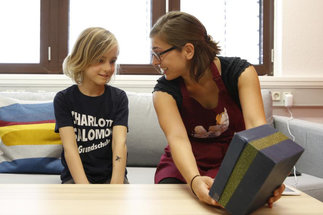Projects
The iSearch research program explores the development of ecological and active learning across the life span. The projects we are currently running investigate different aspects of active learning:
- Information search: How good are children’s active learning strategies? We analyze the effectiveness of children’s information search and hypothesis testing strategies, such as question asking and selective exploration, identifying potential sources of developmental change.
- Ecological learning: Are children’s active learning strategies adaptive? Ecological learning is defined as the ability to flexibly and dynamically select those active learning strategies that maximize efficiency in different learning environments.
- Benefits of active learning: Is active learning beneficial as compared to more passive forms of instructions? For example, do children learn better what they have learned in an active learning study setting?
Deciding what evidence is most valuable to obtain is a basic challenge faced by learners of any age. Research investigating children’s active information search has used variants of the “20-questions game”, where the task is to identify an unknown target object by asking as few yes-or-no questions as possible, either generating the questions from scratch or selecting them from a list of given alternatives.
[more]
Active learning strategies cannot be defined as optimal in absolute terms. Instead, their efficiency depends on children’s prior knowledge and expectations, as well as on the task’s information structure, that is, the number of hypotheses available and their likelihood.
[more]
One of the most widespread ideas in education is the virtue of being an active learner. Over more than half a century, a succession of educational theories have each advanced a new image of what it means to be active during learning and the purported benefits relative to passive instructional conditions.
[more]


